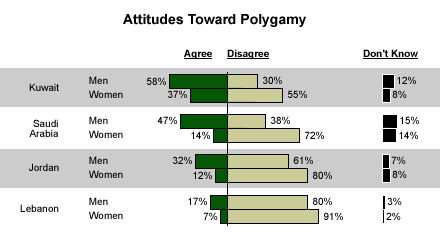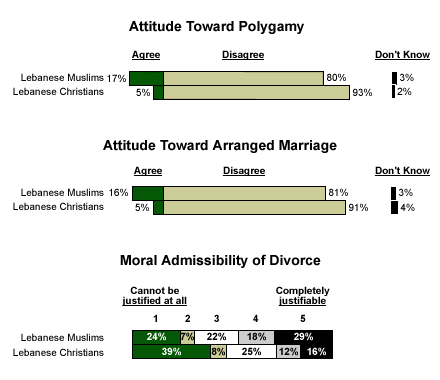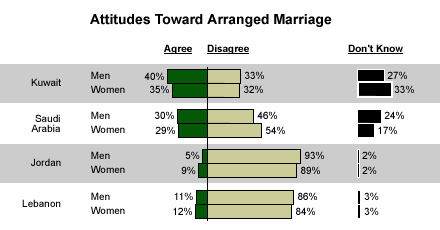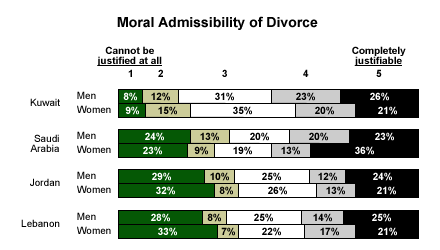"…Marry women of your choice, two or three or four; but if ye fear that ye shall not be able to deal justly with them, then only one…" -- Sura 4:3 -- The Holy Quran
Although very much a minority practice, the taking of multiple wives is permitted within the Islamic faith -- on the explicit, and formidable, condition that the husband is capable of treating each wife justly and equitably.
While polygamy remains relatively rare, arranged, monogamous marriages are not uncommon in the more traditional rural sectors of these societies. And divorce is legal throughout the Islamic world, with rates in some countries approaching or even exceeding those characteristic of the West.
Gallup's recent poll of nine predominantly Islamic countries included an extra battery of questions regarding social values in four of the countries -- Saudi Arabia, Kuwait, Jordan and Lebanon. Among these questions were several relating to the institution of marriage. How do the residents of these four countries view the practices of polygamy and arranged marriage? To what extent do the perspectives of men and women in these societies differ? What differences exist between the perceptions of the Muslim majority in Lebanon and those of the Christian minority, for whom polygamy is forbidden?
Attitudes Toward Polygamy
The practice of polygamy remains the exception rather than the rule, even within the Arabian Peninsula itself (Kuwait and Saudi Arabia). In none of the four countries does a majority of adults express personal agreement with polygamy. Nevertheless, there are dramatic differences in the views men and women hold on this issue -- particularly within Saudi Arabia and Kuwait.

Over half of all men in Kuwait (58%) say they personally agree with polygamy, as does a plurality of men in Saudi Arabia (47% agree, 38% disagree). In stark contrast, however, a majority of Kuwait's women (55%) say they disagree with the practice -- as do nearly three-fourths (72%) of women in Saudi Arabia.
The high level of Saudi women's disagreement with polygamy is especially noteworthy, given that the country is the spiritual heart of Islam and a society in which the role and conduct of women remains very strictly prescribed. In Saudi Arabia, moral strictures require that all respondents in face-to-face, in-home interviews be polled by interviewers of the same gender. Ironically, this may have increased the willingness of women -- and perhaps men as well -- to candidly express their own feelings on this issue.
In Jordan and Lebanon, strong majorities of both men and women disagree with polygamy -- with approval rising only as high as one in three among Jordanian men.
Lebanon is unique among these four societies in that it is not an overwhelmingly Muslim country -- its makeup (and the Gallup sample) is 57% Muslim and 43% Christian. But Muslims and Christians within Lebanon both overwhelmingly disapprove of polygamy: 93% of Christians disagree with the practice, as do 80% of Muslims.

Attitudes Toward Arranged Marriage
Attitudes regarding arranged marriage are markedly different in that there are no distinct differences in levels of approval between men and women -- arguably because an arranged marriage can work to either sex's advantage or disadvantage. In none of these four countries does a majority of either men or women express approval for arranged marriage.

The nearest thing to an exception is Kuwait, where narrow pluralities of both men and women express approval of arranged marriages, with significant proportions either unsure or unwilling to venture an opinion on the practice.
In Saudi Arabia, men and women are both more likely to disagree than agree with the notion of an arranged marriage. In Jordan, there is overwhelming rejection between both sexes -- roughly nine in 10 said they disagree with the practice. In Lebanon, the pattern is virtually the same, with more than four-fifths of men and women alike expressing disapproval. And, as with polygamy, Muslim Lebanese are nearly as likely to disagree with arranged marriages (81%) as their Christian compatriots (91%).
Attitudes Toward Divorce
Gallup also asked both men and women about the moral admissibility of divorce. For this question, a five-point scale was used, ranging from the view that divorce can be completely justified, to the conviction that divorce cannot be justified at all.

In Jordan and Lebanon, more hold the view that divorce can never be justified morally than say that divorce can be completely justified. Interestingly, in the more conservative societies of Saudi Arabia and Kuwait, the reverse is true: those who view divorce as entirely justifiable morally actually outnumber those who strongly condemn divorce, though by a very narrow margin in Saudi Arabia.
As with arranged marriage, the views of men and women are generally quite similar regarding the moral admissibility of divorce. An exception is Saudi Arabia, where women (36%) are more likely than men (23%) to express the opinion that divorce can be completely justified morally. In Lebanon, women are slightly more likely than men to disapprove of divorce on moral grounds.
It is striking that the generally permissive attitude toward divorce that Muslims in these four societies voice is not prevalent among the Christian minority in Lebanon. Muslim Lebanese are at least as likely to say the find divorce completely justifiable (28%) as never justifiable (24%). Lebanon's Orthodox Christians, however, take a far less liberal attitude -- they are more than twice as likely to see divorce as never justifiable (39%) as completely justifiable (16%).
